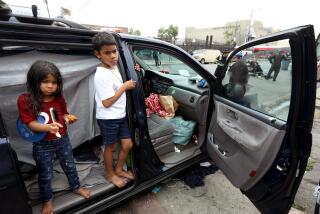For Many Children in Mexico City, Every Day Is Another Hard Lesson in Survival
- Share via
MEXICO CITY — Felipe Maldonado, a shy, thin 6-year-old, sits quietly on a downtown street corner behind neat stacks of gum, hoping somehow for another day of survival.
“I wish I could be playing and going to school like the other kids,” Felipe said as secretaries and bureaucrats hurried past.
For Felipe and thousands of other children in this burgeoning city of 18 million, education and recreation are mere dreams.
No one has documented their exact numbers, but the sight of small children working on the street is nearly as common as the taco vendor. From the elegant Paseo de la Reforma and the Pink Zone shopping district to the teeming working-class barrios of Tepito and Nezahualcoyotl, children are working everywhere--shining shoes, washing windshields, juggling oranges or delivering parcels through the bustling, smoke-filled streets.
They are struggling to survive against the legacy of decades of poverty, compounded by a 6-year economic crisis that has unleashed crushing unemployment in the lower classes and 160% inflation on the country.
Early every morning, Felipe boards a city bus and heads to a massive candy and gum market in Mexico City’s center to procure his merchandise for the day’s business.
By 7:30 a.m. he is perched on his corner, patiently waiting for the sporadic customer to drop 100 pesos (about 4 cents) into his small can for a pack of gum. On a good day he will net some 5,500 pesos--or $2.50--which is below the official daily minimum wage of $3.30.
Children like Felipe “are the youngest soldiers in the lower class’s daily fight for survival,” said a social worker. “The few pesos they scrape out can mean the difference between their family eating dinner that night or not.”
The social worker, who asked not to be identified, was trying to enroll two boys in a state-run assistance program that is “trying to get these kids off the street and into the classroom,” said Luis Alvaro Ordones, an official of the National System for Integral Family Development (DIF).
“We can point to some successes, especially among the younger children, but there is still far to go,” he said.
Alvaro said the DIF’s Program for Minors in Extraordinary Situations approaches children where they live or work and tries to enlist family cooperation in returning youngsters to school.
More to Read
Sign up for Essential California
The most important California stories and recommendations in your inbox every morning.
You may occasionally receive promotional content from the Los Angeles Times.













